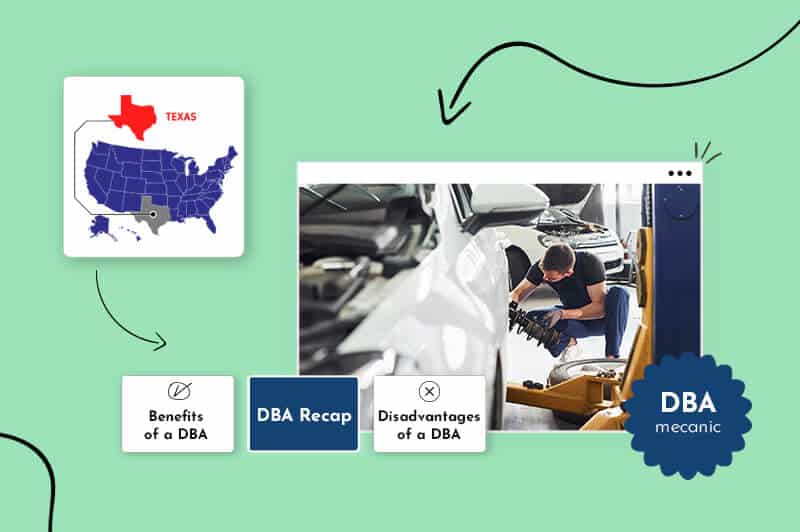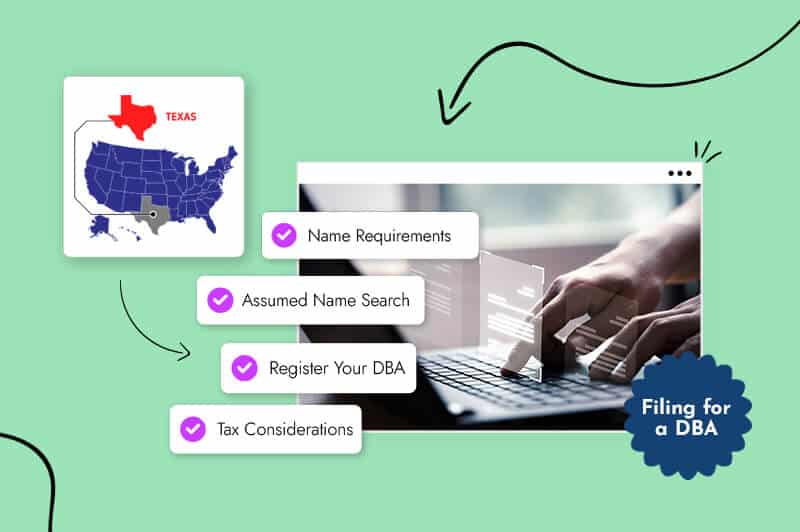
LLC Formation → Texas LLC → How To File a DBA in Texas

A DBA is also known as a trade name or fictitious business name that you can use for your business after you’ve registered it with the state of Texas and local municipalities. In Texas, the DBA is called an assumed name.
It applies to all business entities and can be used whether you’re an LLC, corporation, sole proprietorship, limited partnership or limited liability partnership. The DBA is typically used when you want to use multiple names for your Texas business or when you are a sole proprietor or partnership that wants to use a different name than your legal name.
A DBA filing allows you to rapidly start using a name even if you do not have a formal business entity. Informal business structures like sole proprietorships and other partnerships can use a DBA for basic business functions, such as banking and marketing.
If you are a sole proprietor or a single-member LLC without employees, you do not have to file for or use an Employer Identification Number (EIN) if you have a DBA registered.
You can also have multiple DBAs within one business entity. For example, if you have different online businesses, you can use a DBA for each one without creating a separate business structure, such as an LLC for every site. From a marketing and branding strategy, this creates tremendous efficiencies; you can establish different brands and position them by using DBAs within a master LLC structure.
Tax responsibilities are the same with a DBA. With an LLC, your tax requirements remain the same with a DBA.
Finally, a Texas DBA filing allows you to maintain privacy in your financial affairs. Your DBA lets you open a business bank account that’s separate from any personal banking.
There are several disadvantages to using a DBA, and the tax passthrough status is one. It does not provide any additional tax advantages.
In addition, you have no liability protection. A DBA is not a business entity. It merely allows you to operate under a name other than your company’s actual name. As the owner, you would be liable for any debts or judgments issued against the business as the result of lawsuit claims.
No. You do not need to use a DBA. However, many business owners find it a good optional strategy to deploy if it fits with their overall business strategy.

Filing a DBA in Texas takes several steps related to the name you choose and how you use it, depending on your business structure.
You want to choose a DBA that will be memorable and catchy. Remember, you’ll likely be using your DBA for everyday business operations, meaning it may appear in signage, ads and other marketing materials.
Like other states, Texas places some restrictions on the types of names you may and may not use. Specifically, your name:
Certain words related to specific kinds of organizations are also off-limits, including the following:
You also may not use designators such as “L.L.C.” in your DBA.
To begin the process, you need to determine if your desired name is already taken within the state of Texas.
You can begin by searching for available names using the state comptroller’s online site or SOSDirect, a service provided by the Secretary of State. You may also contact the Secretary of State’s office directly to inquire if a name is available.
You will then submit your name to register it with the state.
To register, you will need to submit Form 503 – Assumed Name Certificate. The form asks for the following information:
You may use the SOS Direct service to file for an assumed name certificate online. The cost is $25.
To mail your application, you can send it to:
Secretary of State
P.O. Box 13697
Austin, TX 78711-3697
You can fax your application to (512) 463-5709.
If you’re paying by credit card, you’ll need to pay the $25 filing fee plus a 2.7 percent convenience fee.
If submitting in person, the application should be delivered to:
James Earl Rudder Office Building
1019 Brazos St.
Austin, TX 78701
Failure to register a DBA could result in civil or criminal action. If a civil suit is filed, the violator may need to immediately file an assumed name certificate to be a party in the lawsuit.
Intentional deception is considered a Class A misdemeanor.
There are no tax implications to filing a DBA as it is not a legal business structure.
There are many advantages to having a DBA as an LLC. The process allows you to use a more recognizable name, an assumed name in Texas, that is different from your legal name. While there are no tax benefits to creating a DBA, there are decided marketing and operational advantages to using this important tool.
This portion of our website is for informational or educational purposes only. Tailor Brands is not a law firm, and the information on this website does not constitute legal advice. All statements, opinions, recommendations, and conclusions are solely the expression of the author and provided on an as-is basis. Accordingly, Tailor Brands is not responsible for the information and/or its accuracy or completeness. It also does not indicate any affiliation between Tailor Brands and any other brands, services or logos on this page.
Products
Resources
©2025 Copyright Tailor Brands